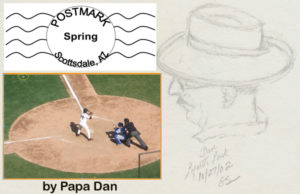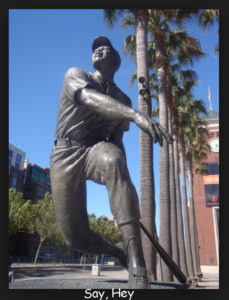Baseball Rules — 2019

To those who think baseball is dull
and want to speed up the game:
“Tell them two things:
First, explain the planning, strategizing,
calculating, and deception
that takes place before every pitch.
Then, quote Hall-of-Fame announcer Red Barber
— ‘Baseball is dull only to dull minds.’ ”
Click here to download a PDF of this post:ConVivio_baseball_rules_Mar2019
= = = = = = = = = = = = = = = = = = = = = = = = = = = = = = = = = = = = =
Baseball It’s the middle of March, and right now I am deeply embroiled in Golden State Warriors’ basketball. The NBA playoffs are fast approaching and there is much at stake. Heck, there’s an important game tonight (aren’t they all?). BUT the sun is shining this week and baseball is in the air. So, there are some things we must discuss.
It’s the middle of March, and right now I am deeply embroiled in Golden State Warriors’ basketball. The NBA playoffs are fast approaching and there is much at stake. Heck, there’s an important game tonight (aren’t they all?). BUT the sun is shining this week and baseball is in the air. So, there are some things we must discuss.
Disclaimer: As I’ve written before, I was a basketball player, not much of a baseball player. Basketball was the only sport I was any good at, but I grew up loving baseball — I watched it ever since 1961 when my brother-in-law Joe Faletti took me and my nephews to my first Giants’ game at Candlestick Park. I listened to Russ Hodges and Lon Simmons on the radio and I lived and died by the fortunes of My Giants. Baseball mattered to a kid growing up in the 1950s/60s in Antioch, CA. [Click here for my personal, brief playground baseball history.].
While I was not a baseball player in the 1960s, I read everything I could get my hands on about baseball heroes ancient and current and came to understand that much about baseball had not changed in a very long time and that was the way it was s‘posed to be. THAT meant that the achievements of ancient players I read about — Babe Ruth, Bobby Thompson — were just as important as, and comparable to, those of the heroes of my youth— Willie Mays, Willie McCovey, Juan Marichal, and the rest of My Giants — and those of today’s 21st-century Giants — Buster Posey, Madison Bumgardner. It also meant that the strategies of baseball managers — from Leo Durocher to Alvin Dark to Bruce Bochy — didn’t change either.
Of course, I learned early that in baseball, as with any sport, the rules mattered. I needed to know the rules inside and out if I hoped to have intelligent conversations about baseball with other kids and adults — or if I was going to follow what I was hearing on the radio.
Last year at this time, I wrote about My Giants and it was mostly paying homage to baseball memories (click here to take a look at that one: Baseball 2018).
So, what is this Giants fan thinking about, here in March of 2019?
Baseball Rules
Baseball has two kinds of rules: unwritten rules and written rules.
The Unwritten Rules of Baseball
The unwritten rules of baseball must NEVER be violated. There are 29 of them. I will offer these six to serve as examples:
Unwritten baseball rule #2: Thou shall not say the words “No hitter” in the midst of a no hitter. The penalty for violating this rule is that a no hitter will not happen.
Unwritten baseball rule #5. Do not make the first or third out in an inning at third base. You’re already in scoring position at second; don’t be greedy.
Unwritten baseball rule #11. Do not “show up” the other team or a player. This means don’t admire a home run you have hit or gesture happily after striking someone out. Act like you’ve done it before and you expected it. Otherwise, bad things will happen.
Unwritten baseball rule #18. Stealing signs is allowed, if you don’t get caught. BUT, do not peek at the catcher’s signs while you are hitting. If you do, the next pitch will be aimed at your head.
Unwritten baseball rule #23. A pitcher that is getting pulled from the game must always HAND the ball to the manager while he waits for him ON the mound. This rule has been violated occasionally by players who had short careers in the major leagues.
Unwritten baseball rule #27. Do not step on the chalk lines as you walk on or off the field. Bad things will happen if you do.
These “rules” have been in force for the better part of 150 years and do not change. Period.
The Written Rules of Baseball
OK, now we get to the REAL issues that loom over major league baseball today. As reported recently in the NYT and the SF Chron, a number of dramatic rule changes have been swirling around Major League Baseball (I tried to avoid adding the phrase ‘like a plague of locusts’). To most of us who grew up with baseball as an everlasting, never-changing presence in our lives, these suggestions have been dismissed as meaningless meanderings of deranged minds. BUT, these are starting to get serious — SO SERIOUS in fact, that the independent minor league Atlantic League will be testing some of the proposed rules this coming season. This ‘very minor’ league has eight teams spread across the country from New York to Texas. Below is a quick summary of some of the new rules they will be trying out and a humble assessment of them.
Three-batter minimum: Once a relief pitcher enters a game, he must face at least three batters, unless the half-inning comes to an end. If you’re the manager under this rule, you won’t be allowed to bring in a particular pitcher to pitch to one particular hitter and then pull him out.
— According to Bruce Jenkins, MLB is considering implementing this rule in 2020, even if the players union protests.
— In My Humble Opinion (IMHO): this is crazy.
Extra-inning “tiebreaker”: To prevent really long extra-inning games, each extra half-inning would begin with a runner on second base. According to Bruce Jenkins: “… no chance.”
— IMHO: This is pure evil. I still remember listening to my transistor radio lying in bed late into the night of July 2, 1963. Warren Spahn of the Milwaukee Braves and Juan Marichal of the SF Giants BOTH pitched 16 shutout innings tied 0-0 until Willie Mays came up in the bottom of the 16th and hit one into the left field stands to win 1-0. Historic games like this should not be made unlikely with silly rules like this one.
Banning the shift: This rule would require that two infielders be stationed on each side of the second-base bag when the pitch is released — otherwise, a ball is called.
— Once again, it takes a strategic option away from a manager and it deprives us all of the possibility of seeing a powerful pull hitter try to lay down a surprise bunt (in my memory McCovey tried this at least once). MLB plans to consider this one for the 2020 season.
— IMHO: NO! Managers should be able to position their defense anywhere they think would be to their advantage. If they try something unusual and get burned — that will be entertaining.
Mound visits eliminated: That’s right, no visits by a catcher, infielder or manager unless a pitching change happens.
— MLB reduced the number of visits and may drop it to four for 2020. Some want visits ended.
— IMHO: There are good tactical reasons for having strategic discussions in key situations, even to stall for time while a pitcher warms up in the bullpen. I say don’t limit visits any further. Adding some thought and discussion to the game is a good thing — and what’s your hurry?
“No Pitch” intentional walks: What about the idea of intentionally walking a batter by simply waving him to first base? Over the years there have been times when a runner advanced because an intentional ball got away from the catcher — in some cases a runner has scored from third.
— IMHO: I don’t think it is an improvement to remove an opportunity for players to make a mistake with consequences. That’s a key part of the game. I say make them throw the pitches.
Pitch clocks: For years, the Official Baseball Rules requires that the pitcher shall deliver the ball to the batter within 12 seconds after he receives it, if the batter is in the box. MLB could simply enforce the existing rule, but the players hate it.
— IMHO: as my Italian ancestors used to say “Fuhgeddabowdit.”
Reduced time between innings: The Atlantic League will be cutting commercial time from 2:05 to 1:45. MLB is reducing the time from 2:20 to 2:00 in national telecasts.
— IMHO: I don’t care about this one, since there are easy technical work-rounds for television.
The mound moved back: The mound has been 60 feet, six inches from home plate since 1893
— the Atlantic League is going to move it back two feet to 62 feet, six inches. The idea is to cut down on the increasing number of strikeouts — a good thing — which it is likely to do.
— IMHO: this is outrageous and the second-worst rule-change idea I have heard. This would change everything and make all of our historic standards and records meaningless. Fortunately, MLB doesn’t seem to be interested in it — but it’s early. You should worry.
Robot umpires: This one is the single worst rule-change idea I have heard. While proposals for implementation of this plan are not as horrific as the name suggests, in this plan, balls and strikes will be called digitally and relayed to a human umpire; but fortunately, MLB does not appear to be seriously interested.
— IMHO: Absolutely NOT! If there’s one idea that has always — rightfully — dominated the game of baseball it is that it is a human endeavor built entirely on the reality that outcomes on the field will be determined by the imperfection of the participants at a particular moment. Routine plays will happen as they should; great plays will be noted as grand surprises; and mistakes will be something we must live with. I believe this ”rule” must always also apply to the performance of umpires. If the decision made on the field is an error, we should be stuck with it, just as we are stuck with it when an outfielder throws to the wrong base or a base runner misses a bag.
So, What’s The Hurry?
So, in summary, I will continue to be skeptical of any proposed rule change that is intended to “speed up the game.” All my life, baseball has been called “Our National Pastime.” That name implies that it should be a pleasant way to PASS the time, not to rush through it or shorten it. Sitting in the stands at the ballpark on an afternoon or evening was always intended to be a leisurely time, a time to allow the mind to wander a bit.
And so, IMHO, that is the way it must remain.
![]()